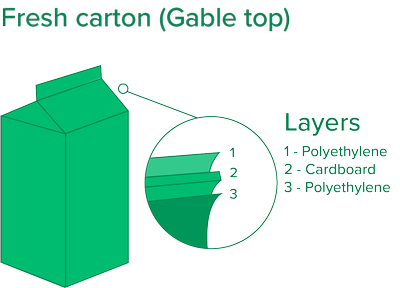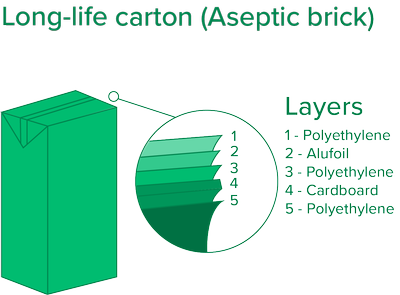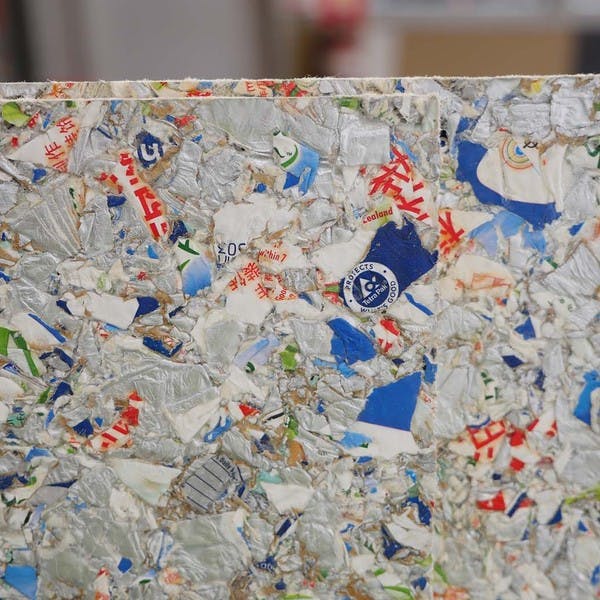 |
 |
Why recycle?
Over one billion beverage cartons are used each year in Australia. They're made from a material called liquid paperboard (LPB), which makes up the largest proportion of the packaging – about 88% of a Tetra Pak 1 litre fresh milk carton for example. When the cartons are recycled, the materials are used to make new paper and cardboard products, keeping resources in use and out of landfills.
The lightweight nature of cartons means they require less energy to transport and refrigerate than other beverage packaging.
What happens to them?
Cardboard can be recycled along with paper and is remade into many kinds of paper products as well as soundproofing material and insulation. Every time paper is processed the individual fibres become weaker, limiting the number of times it can be recycled usually up to eight times.
Cartons collected through Container Deposit Schemes are more likely to be turned into paper products with a higher value such as paper towels. This is because the collection streams are separated, reducing contamination from other recycled products like plastic and glass bottles.
Image: saveBOARD product made from Tetra Pak cartons.
Cash back for recycling
Flavoured milk and juice cartons under 1 litre are accepted for recycling in states that have Container Deposit Schemes (CDS). This includes both long-life (foil lined) and fresh (non-foil lined) cartons.
Some businesses and workplaces collect these containers, take them to their local refund point to collect the cash and put it towards the work Christmas party or other activities.
If it is difficult for your workplace to drop off the containers at a refund point, you can organise to have them picked up by ReCollect who will take a portion of the refund.
Frequently Asked Questions
What is a milk carton made of?
A milk carton is primarily made of paperboard, which is a type of cardboard. However, it also has a thin layer of polyethylene (plastic) to make it waterproof. Some cartons, especially long-life ones, may also have a thin layer of aluminium for added protection. So, a milk carton is a combination of paperboard, plastic and sometimes aluminium.
Are long-life milk cartons recyclable?
Long-life milk cartons are recyclable, but they are not accepted by all councils and recyclers. This is due to an added layer of aluminium on top of the cardboard and plastic for added protection, which makes them harder to recycle. Check with your council or use the information on this page to see if you can put long-life cartons in your recycling bin at home.
Are milk cartons biodegradable?
Biodegradable refers to a material's ability to decompose or break down by living organisms. There are no industry standards or certifications for the term. Products making this claim may degrade (as will most items over time), but without a specified timeframe, this term can be very misleading. A piece of plastic that is biodegradable could take hundreds of years to degrade, which is not a good environmental outcome. Milk cartons are made of cardboard, plastic and sometimes aluminium. While these materials may degrade over a long period of time, it is still harmful to the environment and not a preferred to recycling. Materials that are left to break down in the environment or landfill will release greenhouse gas emissions into the atmosphere and the plastics will break down into microplastics which do not completely decompose. Products claiming to be biodegradable should therefore be considered with caution.<
Do milk cartons go in paper recycling?
Very few councils in Australia have a separated bin for paper and cardboard. If your council has provided you with a separate paper and cardboard recycling bin, it is best to check with them directly to find out which bin milk cartons should be put in. Generally, food and beverage packaging should not be placed in paper and cardboard recycling bins, so co-mingled recycling or the regular garbage bin will likely be the preferred option. If your workplace or business has separated paper and cardboard recycling from co-mingled recycling, generally only paper and cardboard items are accepted. As milk cartons contain a thin layer of plastic and sometimes aluminium, it is best to check directly with the service provider to see if they are accepted.











